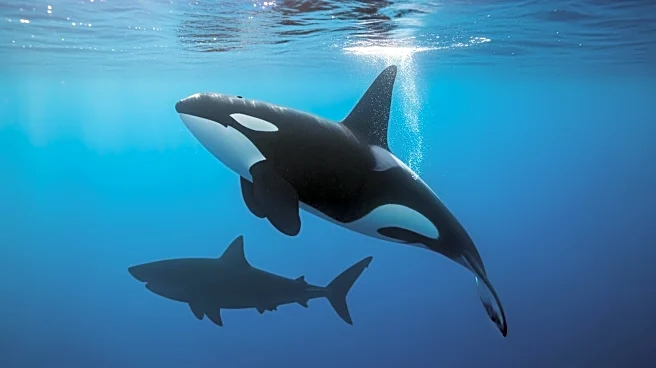What's Happening?
Recent research conducted in Mexico has documented orcas hunting young great white sharks and consuming their livers, marking the first recorded instance of this behavior in the region. The study, published in the journal Frontiers in Marine Science,
utilized drone footage to capture these events, revealing that orcas employ a technique known as 'tonic immobility' to immobilize the sharks by flipping them onto their backs. This behavior has been previously observed in orca populations in South Africa, Australia, and California, but its occurrence in Mexico suggests a potential new seasonal prey pattern for orcas. The study highlights the efficiency of orcas in maneuvering and handling sharks to access their nutrient-rich livers.
Why It's Important?
The documentation of orcas hunting great white sharks in Mexico is significant as it may indicate a new pressure on shark populations in the region. Juvenile white sharks could become regular seasonal prey for orcas, potentially impacting their numbers and ecological balance. This behavior, specific to certain orca groups, underscores the adaptability and learning capacity of orcas, which could have broader implications for marine ecosystems. Understanding these interactions is crucial for conservation efforts aimed at preserving both orca and shark populations, as it provides insights into their ecological roles and the dynamics of predator-prey relationships in marine environments.
What's Next?
The study's findings could lead to increased research and monitoring of orca and shark interactions in the Gulf of California. Conservationists and marine biologists may focus on assessing the impact of this predation behavior on shark populations and developing strategies to mitigate potential negative effects. Further studies could explore the prevalence of this hunting technique among different orca groups and its implications for marine biodiversity. Additionally, the research may inform policy decisions regarding marine conservation and the management of protected areas to ensure the sustainability of both orca and shark species.
Beyond the Headlines
The behavior of orcas hunting great white sharks highlights the complex cultural and social dynamics within orca pods. The ability to learn and pass on hunting techniques suggests a sophisticated level of social interaction and intelligence among orcas. This discovery may prompt further investigation into the cultural aspects of orca behavior and their impact on marine ecosystems. Additionally, the use of drone technology in capturing these interactions demonstrates the growing importance of advanced tools in wildlife research, offering new perspectives and data that can enhance our understanding of marine life.















